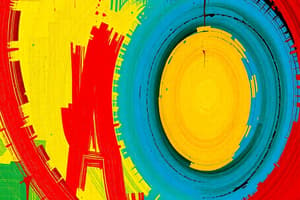Podcast
Questions and Answers
What is the duration of the performer's right from the beginning of the calendar year next following the year in which the performance is made?
What is the duration of the performer's right from the beginning of the calendar year next following the year in which the performance is made?
- Seventy years
- Fifty years (correct)
- Forty years
- Twenty-five years
Which of the following acts is NOT permitted under the performer's right?
Which of the following acts is NOT permitted under the performer's right?
- Broadcasting the performance to the public
- Claiming rights over a performance already broadcasted (correct)
- Making a visual recording of the performance
- Issuing copies of the performance to the public
Under what condition can a performer object to the enjoyment of their right in a cinematograph film?
Under what condition can a performer object to the enjoyment of their right in a cinematograph film?
- If they have a written agreement with a contract to the contrary (correct)
- If the performance is part of a live show
- If they have a verbal agreement
- If their performance is not widely recognized
What does the exclusive right of performers NOT include?
What does the exclusive right of performers NOT include?
What right is conferred on performers without prejudice to the rights of authors?
What right is conferred on performers without prejudice to the rights of authors?
Which act does the performer's right NOT grant authorization for?
Which act does the performer's right NOT grant authorization for?
What is a requirement for a performer to receive royalties for their performances used commercially?
What is a requirement for a performer to receive royalties for their performances used commercially?
What type of medium can a performer’s right apply to for storing recordings?
What type of medium can a performer’s right apply to for storing recordings?
What must occur for an individual to apply for a license to reproduce a work after its first publication?
What must occur for an individual to apply for a license to reproduce a work after its first publication?
For what purpose can a person apply for a license to reproduce a work?
For what purpose can a person apply for a license to reproduce a work?
What condition must be fulfilled regarding the selling of the work's copies in India?
What condition must be fulfilled regarding the selling of the work's copies in India?
What type of license can the Appellate Board grant for reproducing a work?
What type of license can the Appellate Board grant for reproducing a work?
What must each applicant deposit along with their license application?
What must each applicant deposit along with their license application?
What is a requirement for every copy of the reproduced work?
What is a requirement for every copy of the reproduced work?
Who determines the rate of royalties to pay to the copyright owner?
Who determines the rate of royalties to pay to the copyright owner?
What is not a requirement for the grant of a license under this section?
What is not a requirement for the grant of a license under this section?
What power does the Appellate Board have regarding its proceedings?
What power does the Appellate Board have regarding its proceedings?
Under what condition does the Appellate Board ordinarily hear proceedings?
Under what condition does the Appellate Board ordinarily hear proceedings?
How many members constitute a regular bench of the Appellate Board?
How many members constitute a regular bench of the Appellate Board?
What must the Chairman consider when referring a matter to a larger bench?
What must the Chairman consider when referring a matter to a larger bench?
What happens if a member of the Appellate Board has a personal interest in a matter?
What happens if a member of the Appellate Board has a personal interest in a matter?
What status does the Appellate Board hold for legal proceedings?
What status does the Appellate Board hold for legal proceedings?
What ensures that proceedings of the Appellate Board cannot be questioned on certain grounds?
What ensures that proceedings of the Appellate Board cannot be questioned on certain grounds?
What is the significance of sections 193 and 228 of the Indian Penal Code regarding the Appellate Board?
What is the significance of sections 193 and 228 of the Indian Penal Code regarding the Appellate Board?
What is the definition of 'publication' according to the specified act?
What is the definition of 'publication' according to the specified act?
When is a work deemed to be first published in India?
When is a work deemed to be first published in India?
What right does a performer have regarding their identification?
What right does a performer have regarding their identification?
What does the Central Government determine regarding publication in relation to copyright?
What does the Central Government determine regarding publication in relation to copyright?
Which of the following actions is NOT considered a violation of a performer's rights?
Which of the following actions is NOT considered a violation of a performer's rights?
Which organ is responsible for resolving disputes related to publication and copyright duration?
Which organ is responsible for resolving disputes related to publication and copyright duration?
What happens if a work is published or performed in public without the owner's license?
What happens if a work is published or performed in public without the owner's license?
What can a performer do if their performance is distorted or mutilated?
What can a performer do if their performance is distorted or mutilated?
What does a performer NOT have a right to after assigning their performance rights?
What does a performer NOT have a right to after assigning their performance rights?
What criterion does the Appellate Board use to determine insignificant publication?
What criterion does the Appellate Board use to determine insignificant publication?
Which of the following scenarios would likely infringe upon the performer's moral rights?
Which of the following scenarios would likely infringe upon the performer's moral rights?
If a work is published in India and in another country within a month, how is it classified?
If a work is published in India and in another country within a month, how is it classified?
What principle applies to the use of a performance in a bona fide review?
What principle applies to the use of a performance in a bona fide review?
What aspect does 'work of sculpture' include based on the definitions provided?
What aspect does 'work of sculpture' include based on the definitions provided?
Which of the following statements is incorrect regarding a performer's rights?
Which of the following statements is incorrect regarding a performer's rights?
What does the clarification regarding technical modifications state?
What does the clarification regarding technical modifications state?
Flashcards are hidden until you start studying
Study Notes
Copyright Act of India
- The Copyright Act of India governs the rights of authors, performers, and other creators in their works.
- The Act defines terms like "publication", "work of sculpture", and "performer's right".
- The Act outlines circumstances where a work is deemed to be published or performed in public.
- The Act establishes a process for resolving disputes related to publication dates and copyright term lengths.
The Appellate Board
- The Appellate Board has the authority to regulate its own procedures, including setting locations and times for hearings.
- Hearings are typically held in the zone where the person initiating the proceeding resides, works, or carries on business.
- The Appellate Board can be structured into benches for efficiency.
- The Act ensures a fair and impartial process by prohibiting members from participating in proceedings where they have a personal interest.
License to Reproduce and Publish Works
- The Act allows individuals to apply for a licence to reproduce and publish certain works under specific circumstances, such as if copies of an edition are not readily available in India.
- Applications for a licence must be made in the prescribed format and be accompanied by a fee.
- The Appellate Board may grant non-exclusive licences to applicants, subject to conditions relating to royalty payments and distribution restrictions.
Performer's Rights
- The Act grants performers specific rights in relation to their performances.
- These rights, known as "performer's rights", are protected for 50 years from the beginning of the calendar year following the year in which the performance was made.
- The Act outlines exclusive rights for performers, including the right to make sound and visual recordings of their performances and to control their communication to the public.
- The Act clarifies that performers have moral rights, including the right to claim to be identified as the performer and to prevent distortions of their performance that damage their reputation.
Broadcast Reproduction Right and Performer's Rights
- The Act provides that certain acts do not infringe on broadcast reproduction rights or performer's rights, including the making of recordings for private use or research purposes, and the fair use of excerpts for reporting or review.
- The Act specifies that provisions regarding copyright apply to broadcast reproduction rights and performer's rights with necessary adaptations.
- Licenses to reproduce broadcasts cannot be granted without the consent of the copyright holder or the performer.
Studying That Suits You
Use AI to generate personalized quizzes and flashcards to suit your learning preferences.




